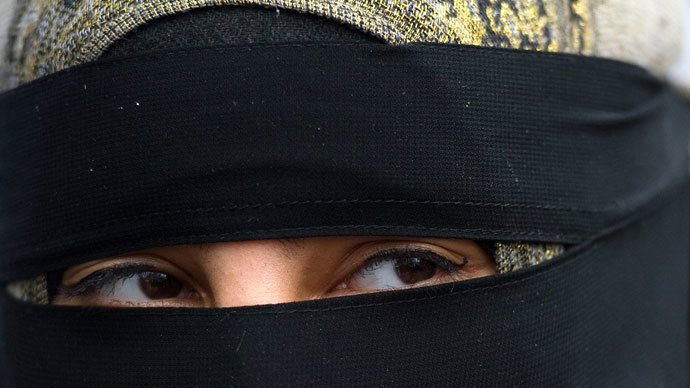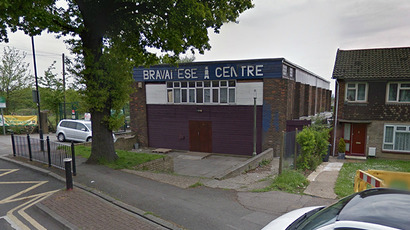Veil threat: UK Muslims outraged by possible ban on religious dress in public

The Muslim community in the UK has been ‘disgusted’ by the idea of a possible ban on Muslim girls and young women from wearing veils in public places. Home Office Minister Jeremy Browne says the government should consider the ban.
“We should be very cautious about imposing religious
conformity on a society which has always valued freedom of
expression,” a Liberal Democrat Minister told The Telegraph.
“But there is genuine debate about whether girls should feel a
compulsion to wear a veil when society deems children to be
unable to express personal choices about other areas like buying
alcohol, smoking or getting married," Browne said.
"That would apply to Christian minorities in the Middle East
just as much as religious minorities here in Britain," he
added.
The chief executive of the Ramadhan Foundation, a group that
works with young Muslims in the UK, said he was
"disgusted" by Browne's comments.
"This is another example of the double standards that are applied
to Muslims in our country by some politicians," Mohammed
Shafiq said.
"Whatever one's religion they should be free to practice it
according to their own choices and any attempt by the government
to ban Muslim women will be strongly resisted by the Muslim
community."
The debate comes after Birmingham Metropolitan College changed
its rules last week in an unprecedented move. It previously
banned Muslim students from wearing niqabs - a veil that leaves
only a slot for the eyes. An online petition against the ban was
signed by 9,000 in 48 hours and forced the institution to drop
the ban, which had been in place for eight years.
An 17-year-old girl who started the protest told the Birmingham
Mail the veil ban was embarrasing.
“It upsets me that we are being discriminated against. I don’t
think my niqab prevents me from studying or communicating with
anyone - I’ve never had any problems in the city before,” the
teenager, who didn't want to be named, said.
Birmingham Metropolitan College is thought to be the only college
in the UK to have banned the niqab, along with hoodies, hats and
caps, so that individuals are “easily identifiable at all
times”.

“They haven’t provided us with another alternative. We said we
would happily show the men at security our faces so they could
check them against our IDs, but they won’t let us," another
student at the college, 17-year-old Imaani Ali, told the Mail.
Liberal Democratic leader Nick Clegg said he was also "uneasy"
about the Birmingham ban.
“I'm really quite uneasy about anyone being told what they
have to wear and I certainly would need to understand why,”
Mr Clegg stated on his weekly LBC 97.3 radio phone-in show.
The guidelines from the Department for Education state that under
the Equality Act 2010, schools must not discriminate against,
harass or victimise pupils because of their: sex; race;
disability; religion or belief.
“Where a school has good reason for restricting an
individual’s freedoms, for example, to ensure effective teaching,
the promotion of cohesion and good order in the school, the
prevention of bullying, or genuine health and safety or security
considerations, then the restriction of an individual’s rights to
manifest their religion or belief may be justified."
Back in 2007, a High Court judge rejected a pupil's appeal to be
allowed to wear the niqab in class. Currently in the UK, schools
and colleges are given carte-blanche to set their own uniform
policies. Headteachers in the UK can order students to remove
veils for security reasons, however.
David Cameron’s spokesman said last week that the British Prime
Minister would be in favor of banning controversial Muslim veils
in his children’s schools. His nine-year-old daughter and
seven-year-old son attend a Church of England junior school in
West London.
"That would apply to every school, every single one, including
the ones that his children may attend. What’s important is to
back the right of schools to set their own uniform policy and
that’s what the government will keep doing," David Cameron’s
spokesman replied.
The Conservative leader may be pushed to reconsider the rules on
veils in schools.
“From a security point of view you need to be able to see the
faces of people – in the House of Commons when we go through a
division [to vote] we are not allowed to cover our face. There is
a security issue here that is worth debating,” the Tory MP
for Wellingborough, Peter Bone, told The Telegraph.
Sarah Wollaston, the MP for Totnes, has also suggested that the
niqab should be banned in schools and colleges, saying the veils
are “deeply offensive”.
“It would be a perverse distortion of freedom if we knowingly
allowed the restriction of communication in the very schools and
colleges which should be equipping girls with skills for the
modern world. We must not abandon our cultural belief that women
should fully and equally participate in society,” she told
the newspaper.
In another much-debated case, a judge on Monday allowed a
22-year-old London-based Muslim woman to stand trial in full face
veil, but ruled she must remove it to give evidence.
The woman, who cannot be identified for legal reasons, earlier
said it is against her religious beliefs to show her face in
public, and her lawyer insisted that the refusal of permission to
wear a veil would breach the young woman's human rights.
Apart from the UK, a push for anti-Muslim laws has been recently
made in France, home to Europe’s largest Muslim population. Last
week leaders of France's 6 million Muslims were outraged by the
new ‘secularism charter’ designed to toughen rules banning
religion from schools. Many Muslims fear that stricter laws at
schools and universities would only deepen the gap between
religions, and step up acts of racism and hatred against them.
In 2004, France passed a law banning schoolchildren from wearing
conspicuous religious symbols, such as Muslim headscarves or Sikh
turbans, but the law excluded universities. Now the High Council
of Integration (HCI) wants to see the same rules applied to
universities. In August, the research institute founded by the
French government recommended prohibiting students from wearing
religious symbols, such as Christian crucifixes, Jewish kippah
skullcaps and Muslim headscarves.














